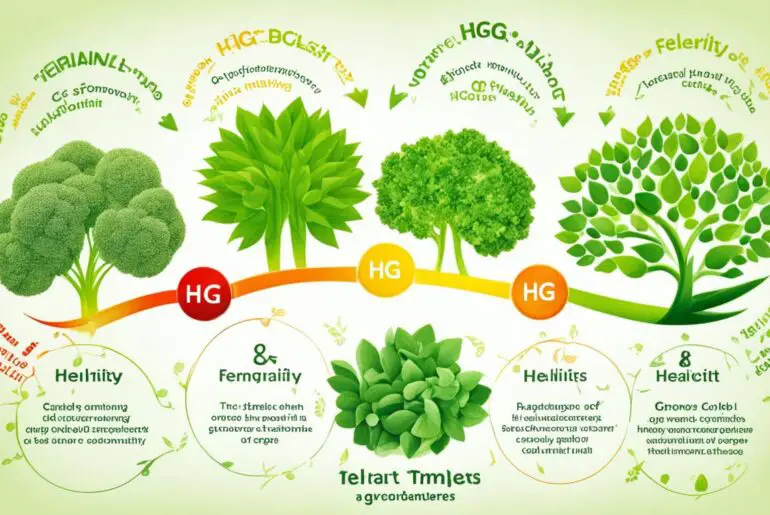Are you tired of trying countless weight loss diets that promise rapid results but leave you feeling frustrated and defeated? The HCG diet may have caught your attention with its claims of melting away pounds in no time. But what if I told you that the key to a successful HCG diet lies not in the hormone itself, but in the carefully structured phases and hormone adjustment?
The HCG diet protocol consists of three distinct phases: the loading phase, the weight loss phase, and the maintenance phase. Each phase serves a crucial purpose in resetting your hormones and optimizing your body for effective weight loss. But how exactly do these phases work, and how can they lead to a successful transformation?
In this article, we will delve into the HCG diet phases and explore the fascinating world of hormone adjustment for weight loss. Discover the science behind the HCG diet, separate fact from fiction, and gain a deeper understanding of how to achieve lasting results.
Key Takeaways:
- Understanding the three phases of the HCG diet is crucial for success.
- Hormone adjustment plays a significant role in optimizing weight loss.
- The HCG diet’s effectiveness goes beyond the hormone itself.
- Scientific evidence does not support the use of HCG for weight loss.
- A balanced and sustainable approach is recommended for long-term success.
Understanding the HCG Hormone
The HCG hormone, also known as human chorionic gonadotropin, is a pregnancy hormone produced by the placenta. Its primary role is to maintain hormonal balance and support the healthy growth of the uterus and fetus during pregnancy.
Although the HCG hormone plays a crucial role in pregnancy, it is important to note that its use for weight loss purposes is not supported by scientific evidence. The FDA does not approve the use of HCG for weight loss, and health experts caution against its use for this purpose.
The Function of the HCG Hormone during Pregnancy
During pregnancy, the HCG hormone helps to maintain hormonal balance by stimulating the production of estrogen and progesterone. These hormones play a vital role in the development and support of the pregnancy, ensuring the proper growth of the uterus and fetus.
The Misconception about HCG for Weight Loss
While the HCG hormone is naturally produced during pregnancy, its use as a weight loss aid is controversial. Some proponents of the HCG diet claim that the hormone can promote fat burning and suppress appetite, leading to rapid weight loss.
“The use of HCG for weight loss purposes is not supported by scientific evidence, and it is not approved by the FDA for this purpose.” – FDA
However, there is no substantial evidence to support these claims. Numerous studies have found no significant difference in weight loss between individuals who receive HCG injections and those who receive a placebo. The weight loss achieved in the HCG diet is primarily attributed to the extremely low-calorie intake and not the HCG hormone itself.
| Fact | Information |
|---|---|
| Full Name | Human Chorionic Gonadotropin |
| Production | Produced by the placenta during pregnancy |
| Function | Maintains hormonal balance and supports healthy growth of the uterus and fetus |
| Weight Loss Benefits | Not scientifically supported or FDA approved |
The Controversy Surrounding the HCG Diet
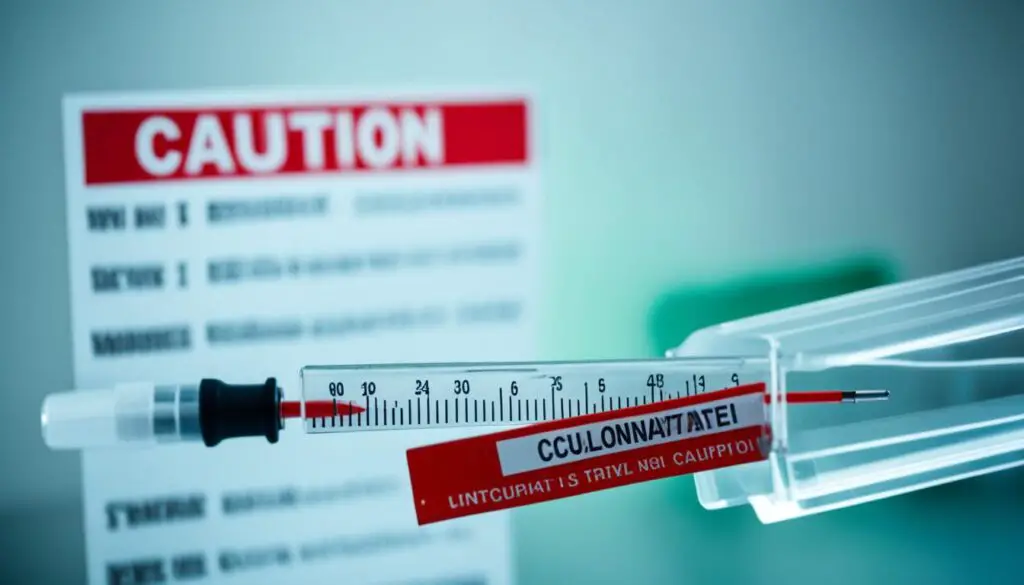
The HCG diet has been surrounded by controversy due to the use of HCG supplements or injections for weight loss. In the United States, these products are illegal and have not been approved by the FDA for this purpose. The FDA has also expressed concerns about the safety of HCG products and the fraudulent weight loss claims associated with them.
Despite the popularity of the HCG diet, there is a lack of substantial evidence to support its effectiveness or safety. Health experts discourage the use of the HCG diet due to these concerns and recommend alternative approaches to weight loss that have been scientifically proven and approved by regulatory authorities.
“The use of HCG supplements or injections for weight loss is illegal in the United States and has not been approved by the FDA.”
The FDA’s Warning on Illegal HCG Products
The FDA has issued warnings to consumers about the dangers of using illegal HCG products for weight loss. These products are often marketed as homeopathic remedies and may not contain any actual HCG. The ingredients in these unregulated products are unknown, posing potential risks to people who use them.
It is important to prioritize your health and safety when considering any weight loss method. Always consult with healthcare professionals or registered dietitians who can provide evidence-based guidance and support throughout your weight loss journey.
The Impact of Fraudulent Weight Loss Claims
The HCG diet has been associated with numerous fraudulent weight loss claims. These claims promise rapid and significant weight reduction, often without the need for exercise or a balanced diet. However, these claims are not supported by scientific evidence and mislead individuals who are seeking effective and sustainable weight loss solutions.
By promoting such claims, individuals are at risk of wasting their time and money on an ineffective and potentially harmful weight loss approach. It is crucial to rely on credible sources of information and consult with healthcare professionals to ensure you make informed decisions about your weight loss journey.
Evidence-Based Approaches to Weight Loss
When it comes to achieving successful weight loss, it is essential to focus on evidence-based approaches. This includes adopting a balanced diet that is rich in nutrients, engaging in regular physical activity, and making sustainable lifestyle changes that promote overall health and well-being.
Achieving weight loss in a safe and sustainable manner requires an individualized approach that takes into consideration factors such as age, medical history, and personal preferences. By consulting with healthcare providers or registered dietitians, you can receive personalized guidance and support throughout your weight loss journey.
The Three Phases of the HCG Diet
The HCG diet is structured into three phases: the loading phase, the weight loss phase, and the maintenance phase. Each phase serves a specific purpose to help individuals achieve their weight loss goals. Let’s take a closer look at each phase:
The Loading Phase
The loading phase is the initial stage of the HCG diet. During this phase, individuals are encouraged to consume high-fat, high-calorie foods to prepare the body for the subsequent calorie restriction in the weight loss phase. This phase typically lasts for two days and allows the body to store enough fat to utilize during the weight loss phase.
The Weight Loss Phase
The weight loss phase is the centerpiece of the HCG diet. It involves a significant reduction in caloric intake and the continued use of HCG supplements or injections. Caloric intake during this phase is limited to a range of 500-800 calories per day. The HCG hormone is believed to help with fat burning while preserving muscle mass. This phase generally lasts for several weeks, depending on individual weight loss goals.
The Maintenance Phase
The maintenance phase is the final stage of the HCG diet. Once the desired weight loss is achieved, individuals transition into the maintenance phase to stabilize their new weight. During this phase, caloric intake is gradually increased while avoiding sugar and starch to maintain the results achieved during the weight loss phase. By gradually reintroducing higher calorie foods, individuals learn how to sustain their weight loss and establish long-term healthy eating habits.
It is important to note that the specific duration of each phase may vary depending on individual progress and goals. Consulting with a healthcare provider or registered dietitian can provide personalized guidance and support throughout the different phases of the HCG diet.
| Phase | Description | |
|---|---|---|
| Loading Phase | Duration: 2 days | High-fat, high-calorie foods |
| Weight Loss Phase | Duration: Several weeks | 500-800 calories per day |
| Maintenance Phase | Duration: Indefinite | Gradual increase in caloric intake, avoiding sugar and starch |
The Role of Calorie Restriction in the HCG Diet

The HCG diet relies heavily on calorie restriction as the primary mechanism for weight loss. By severely limiting caloric intake, the body is forced to tap into its stored fat reserves for energy, leading to rapid fat burning. This caloric deficit creates an energy expenditure that promotes the utilization of fat stores and ultimately results in weight loss.
It is important to understand that the success of the HCG diet in achieving weight loss is primarily attributed to the extreme calorie restriction, rather than the HCG hormone itself. The hormone is believed to have some metabolic effects, but it is the significant reduction in calorie consumption that drives the fat burning process.
It is crucial to note that while calorie restriction can lead to significant weight loss in the short term, it can also have negative effects on overall health and well-being. Extreme caloric deficits may result in nutrient deficiencies, muscle loss, decreased metabolism, and increased risk of rebound weight gain.
It is imperative to approach calorie restriction with caution and under the guidance of a healthcare professional or registered dietitian to ensure that nutrient needs are met and overall health is maintained. Sustainable and balanced weight loss strategies that incorporate regular physical activity, a varied and nutritious diet, and individualized guidance provide a safer and more effective approach to long-term weight management.
The Guidelines for HCG Diet Meals
During the weight loss phase of the HCG diet, individuals are limited to two meals per day, usually lunch and dinner. It is important to carefully plan and choose the right foods to ensure optimal results.
1. Include Lean Protein
Lean protein is an essential component of HCG diet meals. It provides the necessary nutrients and helps you stay satisfied. Some recommended lean protein sources include:
- White fish
- Lean beef
- Egg whites
2. Incorporate Vegetables
Vegetables are low in calories and high in fiber, making them an excellent choice for HCG diet meals. Here are some approved vegetable options:
- Broccoli
- Cabbage
- Lettuce
- Tomatoes
3. Add a Serving of Fruits
Fruits can add natural sweetness to your HCG diet meals. However, it’s important to choose fruits that are low in sugar and calories. Some suitable fruits include:
- Berries
- Citrus fruits
4. Avoid Butter, Oils, and Sugar
Butter, oils, and sugar should be avoided during the weight loss phase of the HCG diet. These ingredients add extra calories and may interfere with the diet’s effectiveness.
5. Stay Hydrated
Hydration is essential during the HCG diet. Water should be your go-to beverage. You can also enjoy coffee and tea in moderation, but it’s important to avoid adding any sweeteners or creamers.
By following these guidelines, you can create nutritious and satisfying HCG diet meals that support your weight loss goals. Remember to consult with a healthcare provider or registered dietitian for personalized advice and recommendations.
The Risks and Side Effects of the HCG Diet
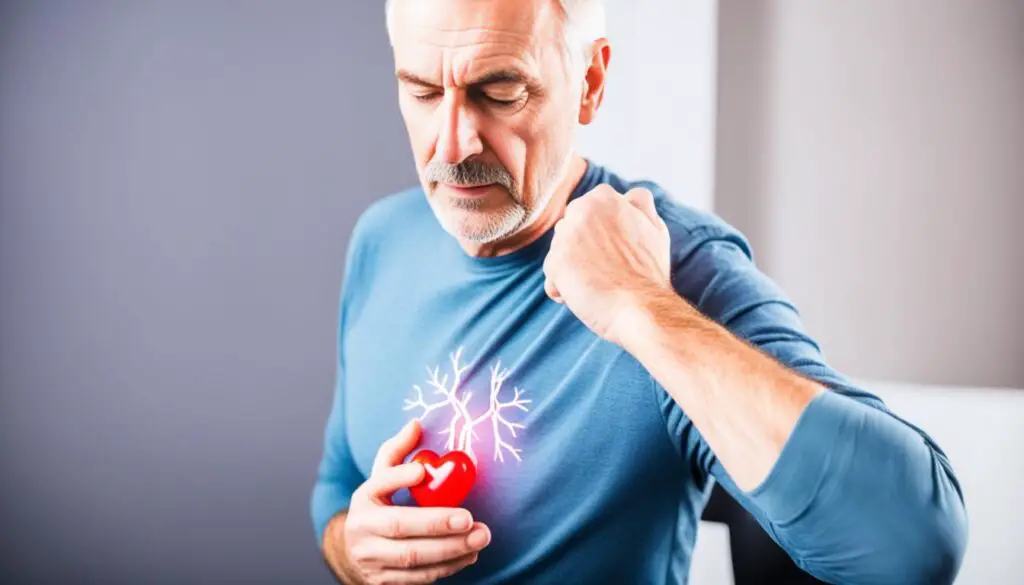
The HCG diet poses significant risks and can lead to various side effects. It is crucial to be aware of these potential dangers before considering this weight loss approach.
Risks of the HCG Diet
The extreme calorie restriction involved in the HCG diet can cause intense hunger, headaches, fatigue, and other unpleasant symptoms. The severe deprivation of energy and nutrients can put significant stress on the body.
Potential Side Effects
Along with the risks, the HCG diet may lead to nutrient deficiencies. By eliminating several food groups, the diet restricts essential vitamins, minerals, and macronutrients that are crucial for overall health.
Additionally, the use of unregulated HCG products can pose further health risks. These products often contain unknown ingredients, making it difficult to predict their effects on the body. The lack of regulation increases the potential for adverse reactions or complications.
It is important to understand and weigh the risks and side effects of the HCG diet against potential benefits. Consulting with healthcare professionals and registered dietitians is crucial to ensure a safe and informed approach to weight loss.
| Summary of Risks and Side Effects | |
|---|---|
| Hunger | Intense hunger pangs and cravings due to extreme calorie restriction. |
| Nutrient Deficiencies | The elimination of food groups can result in inadequate intake of essential vitamins, minerals, and macronutrients. |
| Unknown Ingredients | Unregulated HCG products may contain unidentified or potentially harmful substances. |
The Lack of Scientific Evidence for the HCG Diet
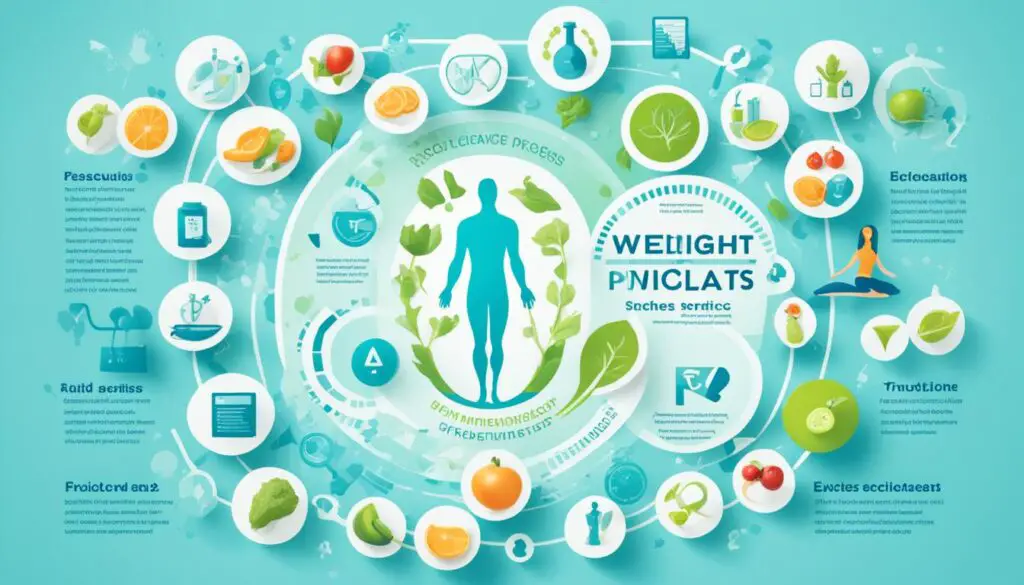
Scientific evidence plays a crucial role in validating the effectiveness and safety of any weight loss method. When it comes to the HCG diet, however, studies have revealed a significant lack of scientific evidence supporting its claims. These studies have examined the role of the HCG hormone in weight reduction and its ability to curb hunger, only to find disappointing results.
“Despite claims of the HCG hormone contributing to weight loss, scientific studies have shown otherwise.”
Multiple studies have been conducted to investigate the effects of HCG injections, comparing them to placebo injections. The aim was to determine whether the HCG hormone itself has any direct impact on weight loss. Surprisingly, these studies consistently found no significant difference in weight reduction between the group receiving HCG injections and the group receiving placebo injections.
The weight loss achieved on the HCG diet can primarily be attributed to extreme calorie restriction, rather than the HCG hormone itself. These findings strongly suggest that any weight reduction experienced by individuals on the HCG diet is likely due to the significant reduction in caloric intake.
The Placebo Effect
It is important to remain skeptical of weight loss methods that lack scientific evidence. The placebo effect, for instance, can play a significant role in misleading individuals about the efficacy of certain treatments or diets. The placebo effect refers to the phenomenon where individuals experience positive effects simply because they believe they are receiving an effective treatment.
In the case of the HCG diet, the placebo effect could be responsible for the reported weight loss experienced by some individuals. The belief in the effectiveness of the HCG hormone, combined with the strict calorie restriction, may create a powerful psychological effect that reinforces the perception of weight loss. However, it is crucial to look beyond subjective experiences and rely on scientific evidence when evaluating the effectiveness of any weight loss method.
Scientific Studies and Weight Reduction
Scientific studies provide valuable insights into the effectiveness of weight loss methods. By conducting controlled experiments and comparing the results with a placebo group, researchers can determine whether a specific intervention leads to genuine weight reduction.
In the case of the HCG diet, scientific studies have consistently shown that the weight loss achieved is primarily due to calorie restriction, rather than the HCG hormone itself. This evidence reveals the importance of a balanced and sustainable approach to weight loss, focusing on overall caloric intake and the quality of nutrition rather than relying on unproven and potentially ineffective hormone-based methods.
It is always recommended to consult with healthcare providers or registered dietitians before embarking on a weight loss journey, ensuring that they provide evidence-based guidance and support.
| Scientific Evidence | Findings |
|---|---|
| Study 1 | No significant difference in weight loss between HCG and placebo groups |
| Study 2 | Lack of evidence supporting the effectiveness of the HCG hormone for weight reduction |
| Study 3 | Calorie restriction, not the HCG hormone, responsible for weight loss |
The Legal and Regulatory Status of HCG Products
When it comes to HCG products for weight loss, there are important legal and regulatory considerations to keep in mind. First and foremost, it is crucial to note that HCG products for weight loss are illegal and have been banned by the FDA.
The FDA, or the U.S. Food and Drug Administration, has not approved HCG products for weight loss. This means that these products have not undergone the necessary testing and evaluation to ensure their safety and effectiveness for weight loss purposes.
In fact, HCG injections for weight loss are only legally prescribed by healthcare professionals for the treatment of female infertility. This means that using HCG injections for weight loss without a prescription is not only illegal but also potentially dangerous.
Furthermore, over-the-counter HCG products that claim to contain the hormone are actually considered homeopathic. Homeopathic products are not regulated by the FDA and are often diluted to the point where they contain no actual HCG.
This lack of regulation means that over-the-counter HCG products may contain unknown ingredients that could potentially be harmful to your health. It is essential to recognize the potential risks associated with using unregulated HCG products for weight loss.
In summary, HCG products for weight loss are illegal and have been banned by the FDA. HCG injections are only legally prescribed for the treatment of female infertility, and over-the-counter HCG products are considered homeopathic and may not contain any actual HCG. It is important to prioritize your health and seek guidance from healthcare professionals before considering any weight loss products or treatments.
The Importance of a Balanced and Sustainable Approach to Weight Loss
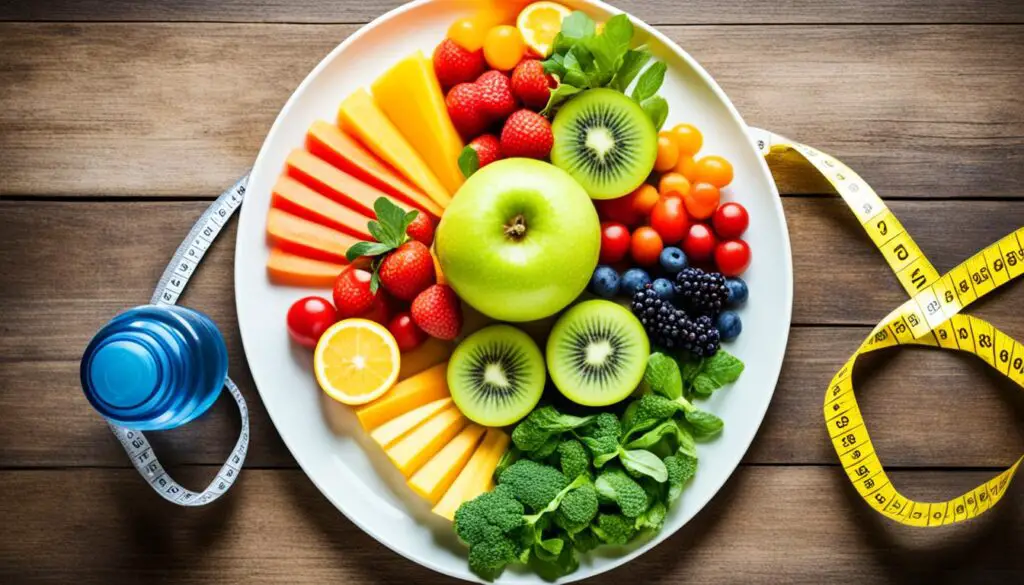
The HCG diet, with its extreme calorie restriction and lack of scientific evidence, is not recommended by health experts for weight loss. Instead, a balanced and sustainable approach is highly recommended to achieve long-term success. This approach involves incorporating regular physical activity, following a nutritious and varied diet, and seeking guidance from healthcare professionals or registered dietitians.
When it comes to weight loss, balance is key. Rather than drastically cutting calories or eliminating entire food groups, focus on creating a well-rounded eating plan that includes a variety of nutrient-dense foods. This will help ensure that your body receives all the essential vitamins, minerals, and macronutrients it needs for optimal function.
Additionally, sustainable weight loss is about making lifestyle changes that are realistic and maintainable in the long run. Avoid falling into the trap of quick fixes or fad diets that promise rapid results. These approaches are often unsustainable and can lead to weight regain once the diet is stopped.
Physical activity is an important component of a balanced and sustainable approach to weight loss. Engaging in regular exercise can help increase calorie expenditure, improve cardiovascular health, boost metabolism, and build lean muscle mass. Aim for a combination of cardio exercises, strength training, and flexibility exercises to promote overall fitness and well-being.
Seeking guidance from healthcare professionals or registered dietitians can provide you with the support and knowledge necessary to navigate your weight loss journey effectively. They can help you set realistic goals, develop personalized meal plans, and provide ongoing education and accountability to ensure your success.
Health Experts’ Recommendations for Balanced and Sustainable Weight Loss:
- Follow a balanced and varied diet that includes all major food groups.
- Incorporate regular physical activity into your daily routine.
- Focus on making long-term lifestyle changes rather than quick fixes.
- Set realistic and achievable weight loss goals.
- Seek guidance from healthcare professionals or registered dietitians.
“A balanced and sustainable approach to weight loss is key for long-term success. It’s important to create healthy habits that can be maintained over time and promote overall well-being.” – Dr. Jane Williams, Registered Dietitian
By adopting a balanced and sustainable approach to weight loss, you can achieve your goals in a healthy and realistic manner. Remember that every individual is unique, so it’s essential to find an approach that works best for you. Consult with healthcare professionals or registered dietitians to create a personalized plan tailored to your specific needs and circumstances.
Consultation with Healthcare Providers for Weight Loss Journey
Before embarking on any weight loss plan, it is crucial to seek guidance from a healthcare provider or a registered dietitian. This is especially important if you have an underlying health condition that may impact your weight loss journey.
An individualized approach is key to ensuring the safety and effectiveness of your weight loss journey. By consulting with a healthcare provider or a registered dietitian, you can receive personalized guidance tailored to your specific needs and goals.
These professionals have the expertise to assess your overall health, identify any potential risks or contraindications, and develop a customized plan that addresses your unique requirements. They can provide valuable insights into nutrition, physical activity, and lifestyle modifications that can support your weight loss goals.
“A healthcare provider or a registered dietitian can help you navigate through the complexities of weight loss and provide you with evidence-based recommendations for long-term success.”
By working with a healthcare provider or a registered dietitian, you can gain a better understanding of how to make sustainable lifestyle changes that promote overall well-being, not just short-term weight loss. They can help you develop realistic goals, monitor your progress, and make necessary adjustments to ensure optimal results.
Remember, your weight loss journey is unique to you, and what works for one person may not work for another. An individualized approach guided by healthcare professionals can help you maximize your chances of success and reduce the risk of potential health complications.
Make informed decisions and prioritize your health by seeking the guidance of a healthcare provider or a registered dietitian before starting any weight loss plan.
Conclusion
In conclusion, the HCG diet is a controversial weight loss plan that combines HCG supplements or hormone injections with extreme calorie restriction. Despite claims of rapid weight loss, there is no substantial evidence to support the effectiveness or safety of the HCG diet. Health experts discourage its use and recommend a balanced and sustainable approach to weight loss instead.
It is important to prioritize your health and well-being when embarking on a weight loss journey. Consultation with healthcare providers, such as registered dietitians or doctors, is essential to receive individualized guidance and support. These professionals can help you develop a personalized plan that focuses on nourishing your body with a variety of nutritious foods, incorporating regular physical activity, and addressing any underlying health conditions.
Remember, sustainable weight loss is a gradual process that requires a long-term commitment to healthy habits. Rather than relying on drastic measures and unproven diets like the HCG diet, it is recommended to adopt a balanced and sustainable approach. By making lifestyle changes and working with healthcare professionals, you can achieve your weight loss goals in a safe and healthy manner.
FAQ
What are the phases of the HCG diet?
The HCG diet consists of three phases: the loading phase, the weight loss phase, and the maintenance phase.
What is the HCG hormone?
The HCG hormone, also known as human chorionic gonadotropin, is produced during pregnancy and plays a role in maintaining hormonal balance.
Is the HCG diet recommended by health experts?
No, health experts discourage the use of the HCG diet due to its extreme calorie restriction, lack of scientific evidence, and potential health risks.
What is calorie restriction in the HCG diet?
Calorie restriction in the HCG diet involves consuming a very low number of calories per day, usually between 500-800 calories.
What are the guidelines for HCG diet meals?
HCG diet meals should include a serving of lean protein, approved vegetables, and a small serving of fruit. Butter, oils, and sugar should be avoided.
What are the risks and side effects of the HCG diet?
Risks and side effects of the HCG diet may include intense hunger, headaches, fatigue, nutrient deficiencies, and potential health risks from unregulated HCG products.
Is there scientific evidence supporting the HCG diet?
No, multiple studies have shown that the HCG hormone does not contribute to weight loss and that the weight loss achieved on the HCG diet is primarily due to calorie restriction.
Are HCG products legal and regulated for weight loss?
No, HCG products for weight loss are illegal and have been banned by the FDA. Over-the-counter HCG products are considered homeopathic and may contain unknown ingredients.
What approach to weight loss is recommended by health experts?
Health experts recommend a balanced and sustainable approach to weight loss, which includes regular physical activity and following a nutritious and varied diet.
Should I consult with a healthcare provider before starting the HCG diet?
Yes, it is important to consult with a healthcare provider or registered dietitian before starting any weight loss plan, including the HCG diet, especially if you have an underlying health condition.




